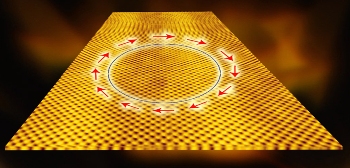Jun 12 2013
One of the world’s brightest sources of soft x-rays, Berkeley Lab’s Advanced Light Source (ALS) is a premier facility for studying the properties of materials. It’s no surprise that ALS beamlines excel at ARPES – angle-resolved photoemission spectroscopy – a fundamental technique for examining electronic structure.
 On the surface of a topological insulator an electron's direction determines its spin orientation and vice versa.
On the surface of a topological insulator an electron's direction determines its spin orientation and vice versa.
When x-ray photons strike the surface of a sample, electrons are emitted (photoemitted), whose angular distribution and kinetic energy directly map the material’s electronic states.
In two fields fast coming to the fore, traditional ARPES is no longer sufficient to meet researchers’ needs. Magnetism, known since ancient times, has acquired new urgency with demands for faster computers and denser memories. Spintronics is the new kid on the block; scientific progress and venture capital alike ride on the promise of future energy-efficient spintronic nanogadgets.
Spin is common to both fields. Electron spin determines magnetic properties and can control how charged currents flow. The latest rage in materials science, topological insulators (TIs), are an extreme example, insulators on the inside but good conductors on the surface – where the electron spin and momentum of fast-moving surface electrons are locked together.
More knowledge about magnetism and spintronics requires new experimental tools: spin-resolved ARPES at the ALS.
“Spin-resolved photoemission is an old technique, but it’s slow, never easy, and requires high-energy electron beams,” says Alexei Fedorov, beamline scientist for ALS beamline 12.0.1. “Brookhaven’s National Synchrotron Light Source (NSLS) has the only beamline in the U.S. that can do spin-resolved photoemission, and it will be shut down soon to build NSLS-II.”
Recently ALS scientist Chris Jozwiak worked with ALS Division Deputy Director Zahid Hussain, Alessandra Lanzara of UC Berkeley, and others to fashion a spin time-of-flight analyzer – enabling spin-resolved ARPES with enhanced efficiency thanks to a spin detector that scatters low-energy electrons from magnetic surfaces. However, it requires wider pulse spacing than normal ALS operations; it can only use the bright and tunable ALS x‑rays during infrequent “two-bunch” operations, and otherwise must use a laboratory laser.
Fedorov, Jozwiak, and Hussain joined Peter Fischer of the Materials Sciences Division, an expert in soft x-ray microscopy of magnetic materials, to propose a spin-ARPES detector specially designed for full-time use at the Advanced Light Source. It won’t need high-energy electrons but will measure spin more efficiently via scattering from a variety of thin-film targets – perhaps including such far-out materials as ultrathin magnetic films peppered with quantum wells and draped in graphene.
A beamline centered on spin-ARPES would offer a wide range of photon energies and excellent energy resolution, a tight focus, and full control of x-ray polarization. With direct sensitivity to spin, it would probe key electronic properties including valence band structure, core electron states, and the spin-dependent scattering of quasiparticles. The spin dependence of electron mobility is linked to a material’s spin-dependent band structure, and spin-ARPES is the only technique with such direct access. The new instrument will affect whole emerging fields, including topological insulators and photo-induced magnetism.
More about unusual magnetic spin states: http://newscenter.lbl.gov/feature-stories/2013/05/21/magnetic-whirlpools/.
More about topological insulators: http://newscenter.lbl.gov/feature-stories/2012/05/14/topological-insulators/.
More about spin-ARPES: http://newscenter.lbl.gov/news-releases/2013/03/12/photoelectron-polarization-tis/.